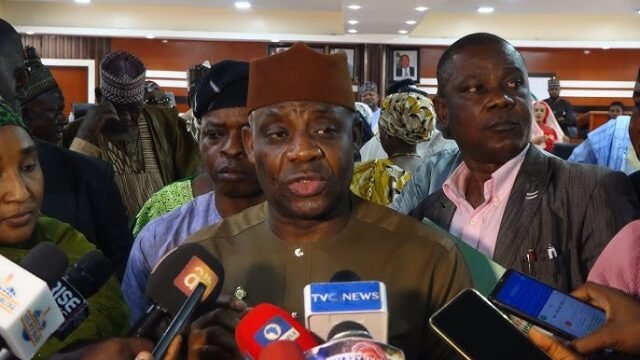The Federal Government has moved swiftly to clear the air over widespread reports suggesting that it had entered into a new agreement with the Academic Staff Union of Universities (ASUU). Minister of State for Education, Dr. Tunji Alausa, while addressing the press in Abuja, stated firmly that no formal agreement has been signed with ASUU.
According to him, what currently exists is only a draft document that emerged from several high-level discussions. “We are still at the proposal stage. No official or binding agreement has been concluded with ASUU. What is in circulation is just a draft,” the Minister said.
The clarification comes at a time when rumours and half-truths have been flying across social media platforms, raising anxiety among students, parents, and lecturers. For many Nigerians, the fear is simple: if agreements are not properly formalised, the university system might once again descend into the cycle of strikes and disruptions that have plagued it for decades.
By emphasising that the documents currently being discussed are not legally binding, the government is signalling that while talks with ASUU are ongoing, the process is far from concluded. This distinction matters greatly, as the difference between a draft and a signed agreement often determines whether classrooms stay open or padlocks return to lecture halls.
Table of Contents

Inside the Draft: A Collaborative Effort Begins
Dr. Alausa explained that the most recent meeting was attended by critical government stakeholders, including the Minister of Labour, the Permanent Secretary of the Federal Ministry of Education, and the Solicitor-General of the Federation. The outcome of this meeting was a draft agreement, which government officials insist is still subject to further review and adjustment.
To ensure that the draft is realistic and fundable, a seven-member technical committee has been set up, chaired by the Education Ministry’s Permanent Secretary, Abel Enitan. This committee is tasked with scrutinising the proposals, adjusting the figures where necessary, and preparing a counter-offer that the government can truly sustain.
The Minister noted that past experiences have shown how rushing into agreements without proper planning often backfires, creating more disputes down the line. “This time around, the Federal Government is determined to avoid making promises it cannot keep,” Alausa stressed.
For ASUU, whose demands centre on improved funding, revitalisation of universities, payment of arrears, and respect for previous agreements, the draft represents an opening for deeper conversation. But until all sides return to the negotiation table and put pen to paper, the draft remains only a working document.

High-Level Mandate: President Tinubu’s Directive
Perhaps the most striking element of the government’s latest position is the role of President Bola Tinubu. According to Alausa, the President has personally mandated the Education Ministry to find a long-term solution to the ASUU question—one that will stand the test of time and ensure that students no longer become pawns in the power play between government and unions.
This is not the first time drafts have been presented to ASUU without leading to a formal deal. However, officials insist that Tinubu’s direct involvement signals a fresh determination to end the cycle of strikes permanently. “Mr. President has made it clear: this matter must be resolved once and for all. We must find a lasting solution, not another stop-gap,” Alausa said.
Observers note that this renewed push could mark a turning point, provided both sides are willing to compromise. In the past, ASUU has accused successive governments of failing to honour agreements, while the government has often countered that ASUU’s demands were unrealistic in the face of competing national priorities.
The current administration, however, appears keen on rewriting this narrative by producing a framework that is both practical and implementable.
What This Means for Nigerian Universities
For millions of students across Nigeria, the current impasse is more than just political drama—it is about the future of their education. Each time ASUU declares a strike, academic calendars are disrupted, students lose valuable months, and parents are left frustrated. The ripple effects often extend beyond classrooms, affecting businesses around university communities and even delaying national service mobilisation.
If the draft under review matures into a binding agreement, stakeholders hope it will deliver a new sense of stability to Nigeria’s tertiary education system. It could mean better funding for laboratories, hostels, libraries, and other critical infrastructure that has been neglected for years. Lecturers, too, are hopeful that improved remuneration and working conditions will allow them to focus on teaching and research, rather than prolonged industrial battles.
Yet, scepticism remains. Nigerians have seen many “drafts” and “agreements” collapse under the weight of poor implementation. Until both parties sign a document and show a genuine commitment to honouring it, the risk of another shutdown still hangs over the nation’s campuses.
For now, students continue to study with one eye on their books and the other on the news, unsure of when another strike might erupt. Parents, on their part, are urging both sides to remember that the real victims of the standoff are young Nigerians whose futures are already under strain from unemployment and economic hardship.

Conclusion
As of Friday, 29 August 2025, the Federal Government’s position is unambiguous: no formal agreement has been signed with ASUU. What exists is a draft awaiting transformation into a workable, fundable plan.
The creation of a technical committee and President Tinubu’s firm directive offer glimmers of hope. But Nigerians know too well that hope is not enough; what matters is action. Until a formal agreement is signed and implemented, the uncertainty that has long haunted Nigerian universities will persist.
For the sake of students, lecturers, and the nation’s future, both government and ASUU must bridge the gap between proposals and reality. Only then will Nigeria’s universities finally enjoy the peace and stability they desperately need.
Join Our Social Media Channels:
WhatsApp: NaijaEyes
Facebook: NaijaEyes
Twitter: NaijaEyes
Instagram: NaijaEyes
TikTok: NaijaEyes
READ THE LATEST EDUCATION NEWS















![Trailblazing Chef Hilda Baci Set to Cook 250 Bags of Rice in Daring Attempt to Break Record for World’s Biggest Jollof Pot [VIDEO] Hilda Baci](https://naijaeyesblog.com/wp-content/uploads/2025/09/hilda-1-180x135.avif)























